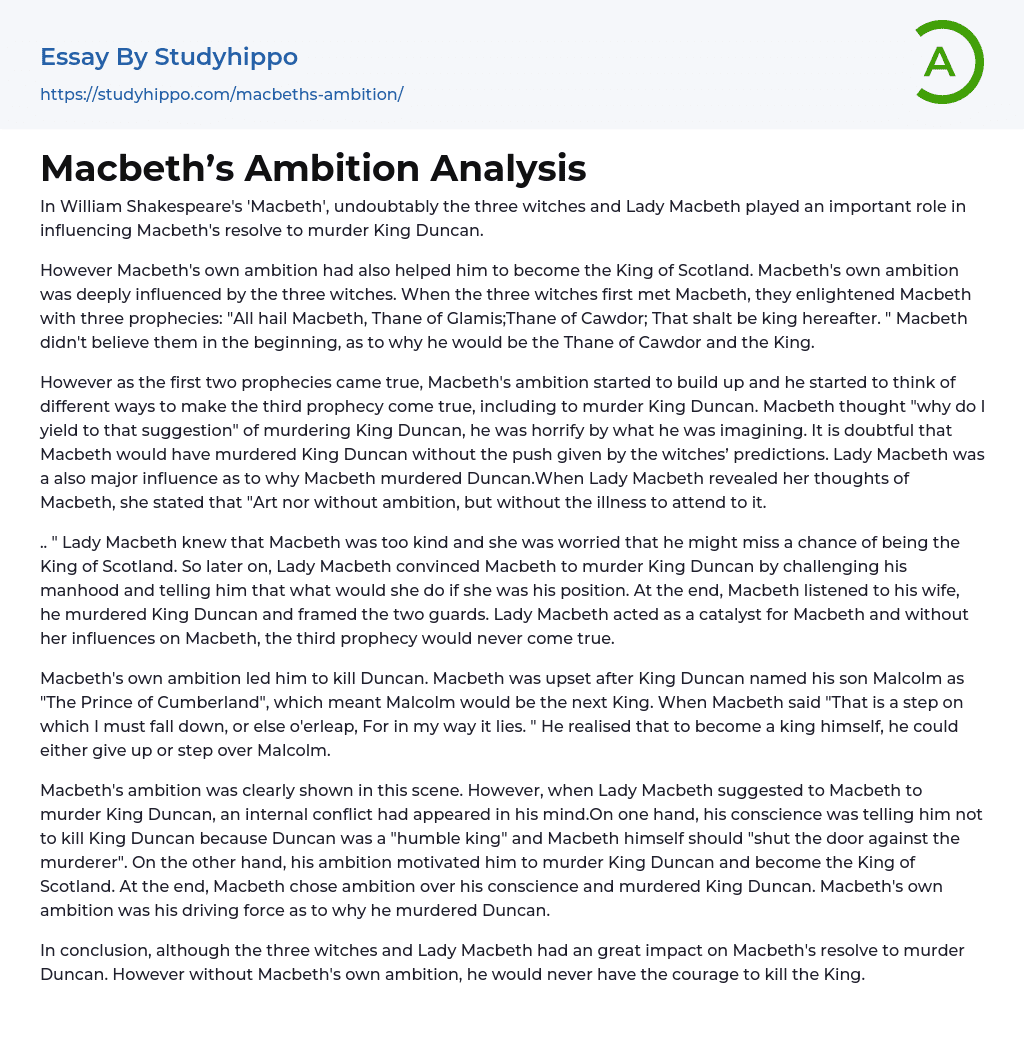In William Shakespeare's 'Macbeth', undoubtably the three witches and Lady Macbeth played an important role in influencing Macbeth's resolve to murder King Duncan.
However Macbeth's own ambition had also helped him to become the King of Scotland. Macbeth's own ambition was deeply influenced by the three witches. When the three witches first met Macbeth, they enlightened Macbeth with three prophecies: "All hail Macbeth, Thane of Glamis;Thane of Cawdor; That shalt be king hereafter. " Macbeth didn't believe them in the beginning, as to why he would be the Thane of Cawdor and the King.
However as the first two prophecies came true, Macbeth's ambition started to build up and he started to think of different ways to make the third prophecy come true, including to murder King Duncan. Macbeth thought "why
...do I yield to that suggestion" of murdering King Duncan, he was horrify by what he was imagining. It is doubtful that Macbeth would have murdered King Duncan without the push given by the witches’ predictions. Lady Macbeth was a also major influence as to why Macbeth murdered Duncan.When Lady Macbeth revealed her thoughts of Macbeth, she stated that "Art nor without ambition, but without the illness to attend to it.
.. " Lady Macbeth knew that Macbeth was too kind and she was worried that he might miss a chance of being the King of Scotland. So later on, Lady Macbeth convinced Macbeth to murder King Duncan by challenging his manhood and telling him that what would she do if she was his position. At the end, Macbeth listened to his wife, he murdered King Duncan and framed the two guards. Lady Macbeth acted a
a catalyst for Macbeth and without her influences on Macbeth, the third prophecy would never come true.
Macbeth's own ambition led him to kill Duncan. Macbeth was upset after King Duncan named his son Malcolm as "The Prince of Cumberland", which meant Malcolm would be the next King. When Macbeth said "That is a step on which I must fall down, or else o'erleap, For in my way it lies. " He realised that to become a king himself, he could either give up or step over Malcolm.
Macbeth's ambition was clearly shown in this scene. However, when Lady Macbeth suggested to Macbeth to murder King Duncan, an internal conflict had appeared in his mind.On one hand, his conscience was telling him not to kill King Duncan because Duncan was a "humble king" and Macbeth himself should "shut the door against the murderer". On the other hand, his ambition motivated him to murder King Duncan and become the King of Scotland. At the end, Macbeth chose ambition over his conscience and murdered King Duncan. Macbeth's own ambition was his driving force as to why he murdered Duncan.
In conclusion, although the three witches and Lady Macbeth had an great impact on Macbeth's resolve to murder Duncan. However without Macbeth's own ambition, he would never have the courage to kill the King.
- Banquo essays
- Macbeth Ambition essays
- Ambition essays
- Anger essays
- Betrayal essays
- Boredom essays
- Confidence essays
- Courage essays
- Desire essays
- Disgrace essays
- Doubt essays
- Empathy essays
- Fairness essays
- Fear essays
- Feeling essays
- Forgiveness essays
- Grief essays
- Guilt essays
- Happiness essays
- Harmony essays
- Hate essays
- Honesty essays
- Honor essays
- Hope essays
- Humanity essays
- Inspiration essays
- Kindness essays
- Laughter essays
- Loneliness essays
- Lost essays
- Loyalty essays
- Need essays
- Passion essays
- Pressure essays
- Pride essays
- Regret essays
- Respect essays
- Responsibility essays
- Sarcasm essays
- Shame essays
- Suffering essays
- Suspense essays
- Tolerance essays
- 1984 essays
- A Farewell to Arms essays
- A Good Man Is Hard to Find essays
- A Hanging essays
- A Lesson Before Dying essays
- A Long Way Gone essays
- A Rose For Emily essays




